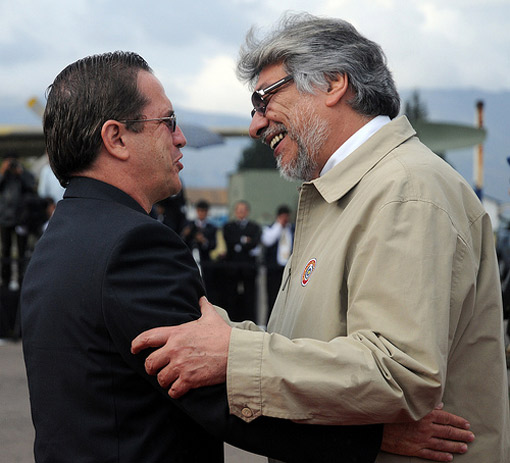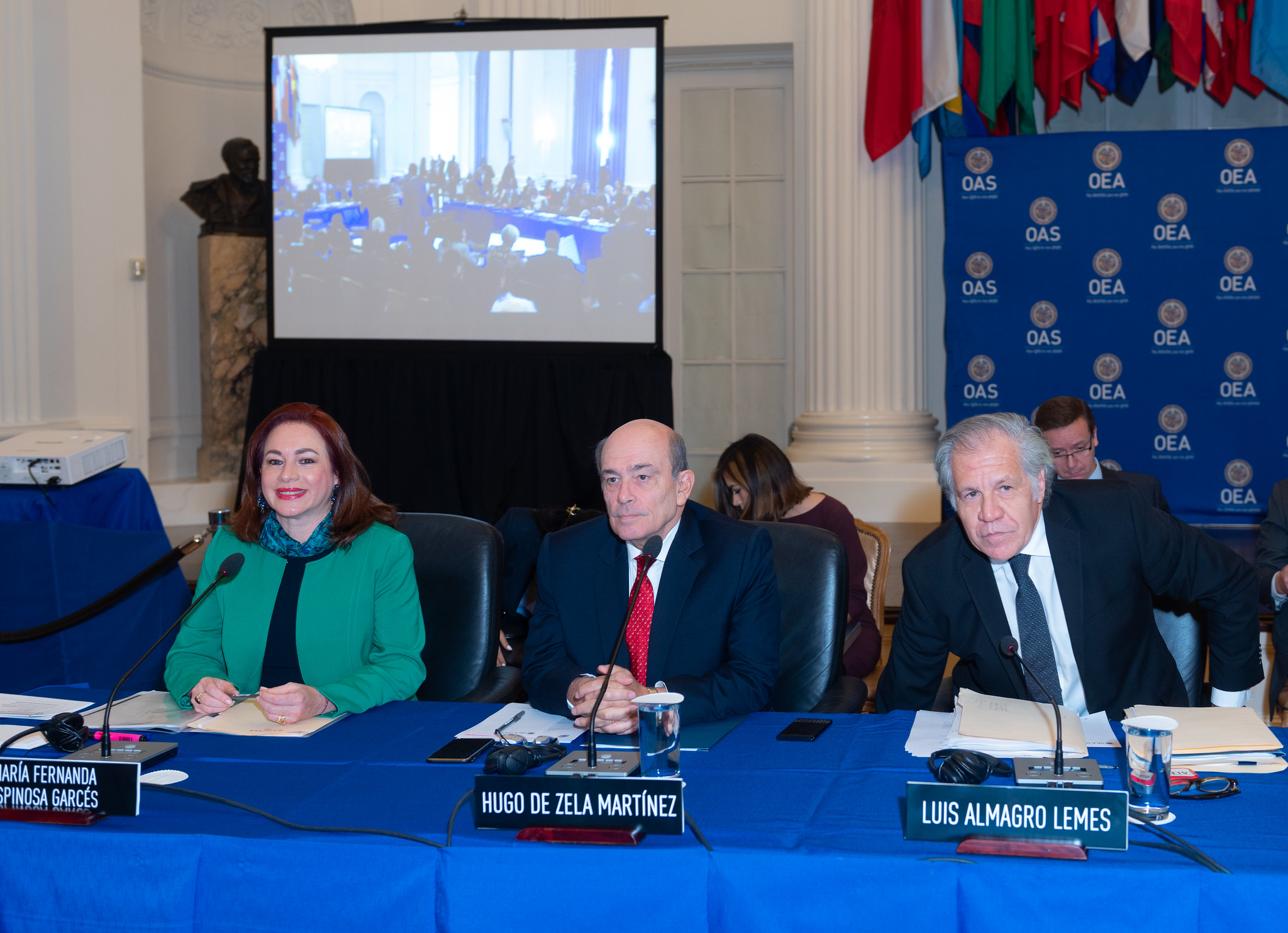Last Friday, the Congress of Paraguay removed President Fernando Lugo from office. The entire impeachment process lasted a mere two days. The presidents of Venezuela, Nicaragua, Ecuador, Bolivia, and Argentina rushed to describe this as a “coup d’état,” while the Brazilian and Uruguayan presidents have called for Paraguay’s expulsion from Mercosur and Unasur due to the democracy clause in each of the treaties.
Mercosur’s Ushuaia Protocol on Democracy (1998) and Unasur’s Additional Protocol on Democracy (2010), as well as the OAS’s Inter-American Democratic Charter (2001), require that states have a democratic system in place in order to be admitted and to participate in each of these international organizations. In other words, a democracy clause seeks to punish anti-democratic governments with isolation from the international community.
But what are the specific events that turn an OAS member state into an anti-democratic one, triggering the application of the democracy clause?
Technically, each organization prohibits the “forcible overthrow,” the “interruption of the democratic order” or the “alteration that seriously impairs the democratic order.” However, given the vagueness of these terms, most international law scholars agree that there are at least three specific events that would turn a state anti-democratic: a “coup d’état;” a “coup-like situation;” and the “erosion” of democracy.
So, did any of those three instances occur in Paraguay?
The term coup d’état is not a legal concept—that is, it is not defined by any valid source of international law nor by any domestic legal order. However, judging from how the term is used by scholars and specialized dictionaries, a coup d’état would refer to a scenario with the following four concurring elements: first, the victim of the coup is the president of a country or another civil authority with full executive control; second, that the perpetrator of the coup has used violence or coercion to remove the victim from his post; third, that the action(s) that constitute the coup are sudden; and fourth, that this action occurs in clear violation of the constitutional procedure to remove the president or chief executive.
Using this exact definition, the Honduran Truth and Reconciliation Commission found last year that the June 28, 2009, forcible expatriation of then-President Manuel Zelaya indeed constituted a coup, in spite of the ex-post facto validation of the coup by the Supreme Court and the constitutional succession to the presidency of Roberto Michelleti, the speaker of the Congress. In fact, Zelaya’s removal was abrupt, violent and in “clear violation of the constitutional procedure to remove the president in Honduras.”
At the time of the Commission’s announcement in July 2011, I noted that: “Article 313(2)(c) of the Honduran Constitution gives the Supreme Court, [not Congress,] the power ‘to adjudicate on the legal actions brought against the highest state officials and congressmen.’ Articles 414 to 417 of the current Code of Criminal Procedure outline each of the steps that a criminal suit against the president must follow.”
But none of these took place. Instead, “President Zelaya was suddenly rousted from bed at gunpoint and exiled to Costa Rica in his pajamas, [while] the Supreme Court decided to stand idle instead of carrying out an ex officio constitutional review of the actions by both the armed forces and Congress.”
In the case of Paraguay, there was no violence involved in the ousting of President Fernando Lugo, so the coup d’état label should be discarded and the presidents of Venezuela, Nicaragua, Ecuador, Bolivia, and Argentina were wrong to call it such.
Another ground for the application of the democracy clause is a “coup-like situation,” where the interruption of the democratic order occurs abruptly. Within these situations, we find the so-called “auto-coups” (when a president shuts down Congress) and “impeachment coups,” or “illegal acts by a disloyal opposition [in Congress] to unseat elected presidents.”1 Did Paraguay’s congress institute an “impeachment coup” against President Lugo?
The Constitution of Paraguay gives that country’s Congress the power to remove the president on either of three grounds—“poor performance of his duties,” “crimes in the exercise of his duties,” or “common crimes.” On these same grounds, Congress may also impeach the vice president, the secretaries of state and other authorities. Article 225 sets forth a two-step impeachment procedure: (1) a resolution of accusation by the House of Representatives; and (2) a decision of culpability and impeachment by the Senate. On June 20, the House of Representatives approved Resolution 1431/2012 accusing President Lugo on grounds of “poor performance of his duties,” and the next day the Senate voted a resolution finding him guilty of “poor performance of his duties,” and removing him.
Throughout the proceedings, President Lugo was given only two hours to present his case and exculpatory evidence before Congress. This swiftness makes human rights bodies such as the Inter-American Commission on Human Rights suggest that his removal was “impeachment coup” because of lack of due process. But given the vagueness of the concept “poor performance of his duties”—arguably, any president performs poorly from the perspective of an opposition legislator—the due process guarantees in Paraguay’s impeachment process are clearly not meant to lie in the length of the proceedings. (Giving a president several months to present evidence of “good performance” will hardly change the minds of legislators that think the president’s performance is “poor” in light of a particular event—in this case, the impeachment followed what congressmen considered a “poor performance” by the president in handling a recent armed confrontation between landless people and police officers that caused 17 casualties.)
Instead, the constitutional due process guarantees for Paraguay’s impeachment trial consist of the supermajority vote—two-thirds of the total members of each chamber, per Article 225. The removal of Lugo was effected by a 76-4 vote in the House, and a 39-6 vote in the Senate, largely exceeding the constitutional minimum.
Furthermore, since its origin in Great Britain and the United States, an impeachment trial is not meant to have the same due process guarantees of a criminal trial or a civil suit. Criminal and civil proceedings consist of adjudication of facts with convincing or compelling evidence requirements because their ultimate consequence may be the imprisonment of the defendant or his obligation to pay a money award to the plaintiff. An impeachment, on the other hand, expresses a withdrawal of confidence by a political body, which leads only to the removal from office and the stripping of government immunities.
Only later, if anyone were to file a complaint against the impeached official (as the U.S. State of Illinois did recently with former Governor Rod Blagojevich), a civil court or a criminal court will follow ordinary proceedings with the appropriate due process guarantees to adjudicate on the possibility of a harsher punishment. As Hamilton wrote in the Federalist Paper No. 65, “after having being sentenced to a perpetual ostracism from the esteem and confidence and honors and emoluments of his country, he will still be liable to prosecution and punishment in the ordinary course of law.”
In some countries, like Argentina and Bolivia, a law further regulates the constitutionally-mandated impeachment trial and establishes stricter due process guarantees, especially for those cases where the president is charged with a crime. Passing a law further regulating Article 225 is something Paraguay might want to consider in order to remove the sense of vagueness surrounding the “poor performance of his duties” phrasing. While Paraguay’s post-Stroessner Constitution (1992) seems to have sought to in fact give Congress an almost arbitrary power to remove the chief executive with the sole supermajority requirement more transparency is necessary going forward in the interest of political stability and consolidation of the rule of law.
While President Lugo’s removal was too swift for the taste of many legitimate critics, he was removed legally through the application of a constitutionally-mandated impeachment trial, carried out on the vague yet constitutional grounds of “poor performance of his duties.” No “impeachment coup” occurred.
The last triggering set of events for the democracy clause is the “erosion” of democracy. These grounds, however, are not supposed to defend a democratically-elected president (as with a “coup” or “coup-like situation”), but rather to hold him accountable for eroding democracy from within (harassing the independent media, extending term limits, holding unfair elections, stacking the judiciary, persecuting opposition politicians, etc.). This is in fact the situation the post-Fujimori government of Peru had in mind when they successfully proposed the OAS to approve the IADC’s democracy clause.
This, of course, did not occur in Paraguay. There are no grounds to apply the OAS, Mercosur and Unasur democracy clauses in this case.
It is curious to note that the leaders of Venezuela, Nicaragua, Ecuador, Bolivia, and Argentina were the ones that rushed to the coup d’état label; their democratically-elected heads of state have shown the least respect to their own countries’ independent media, opposition figures and constitution. In fact, their own actions should already have led to the application of the OAS, Mercosur and Unasur democracy clauses on grounds of “erosion.”
1Dexter S. Boniface, The OAS’s Mixed Record, in Promoting Democracy in the Americas 43 (Thomas Legler et al eds., 2007)







